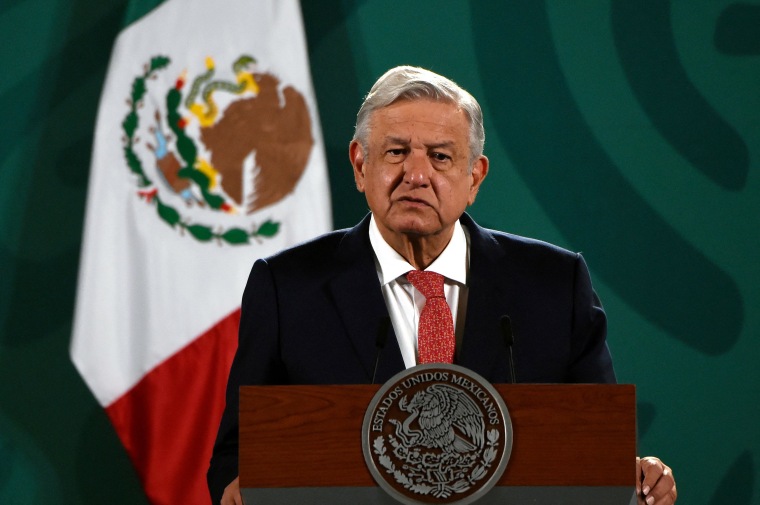WASHINGTON — President Joe Biden met virtually on Friday with Mexican President Andrés Manuel López Obrador as immigration at the border has become a major issue for the Biden administration.
White House press secretary Jen Psaki said the “majority of the conversation was about migration, and was about continued work on coordination, on economic coordination, on taking steps to reduce migration to the border, and they have been a partner in that over the last several months.”
The meeting comes just a few days after a federal judge ordered the Department of Homeland Security to halt its efforts to lift a public health order known as Title 42 that was issued because of the Covid pandemic, a policy that allows the swift expulsion of migrants at the border with the stated aim of preventing the spread of Covid.
Senior administration officials said ahead of the call that Biden planned to discuss Title 42 developments with Obrador.
"We’ve been working in close partnership with Mexico to manage, mitigate and reduce irregular migration, especially as we plan together for the end of the use of Title 42 authority in late May,” one official said. "We’re facing similar challenges and having a common response is really critical.”
In a readout of the meeting Friday night, the White House said the two leaders “discussed the importance of working together with countries throughout the hemisphere to ensure safe and sustainable livelihoods for their respective citizens and migrant populations, to advance our partnership to create jobs in Central America, and support efforts to expand legal pathways for migrants and refugees."
The readout did not specifically mention Title 42.
The administration had sought to end the public health order on May 23, and Republicans have focused on the planned repeal as a point of attack on Democrats over immigration as the primaries for the midterm elections are set to begin. They've denounced the effort to lift the order, with House Minority Leader Kevin McCarthy, R-Calif., visiting the border earlier this week with other GOP lawmakers to speak with Border Patrol agents about the issue.
Roughly 8,000 migrants per day are currently crossing the southern border, according to internal Customs and Border Protection data obtained by NBC News — figures that could lead April to top March’s record high for border apprehensions. The Biden administration predicts roughly 12,000 migrants per day will begin crossing the border if Title 42 is lifted. About half of the migrants encountered are turned back across the border and prevented from seeking asylum. When Title 42 is lifted, immigrants will be allowed to live in the United States while they pursue asylum claims, a process that can take between two to four years.
The Biden administration has also sought to end a Trump administration policy known as "Remain in Mexico" that requires people seeking asylum at the southern border, mainly from Central and South America, to wait in Mexico while their claims are decided. That plan drew a lawsuit from Texas and Missouri, which is now pending before the U.S. Supreme Court.
"We continue to encourage Mexico to invest in its asylum system," the administration official said. "As we work to build efficiencies in our asylum system and to return those that don’t qualify, we ask Mexico to do the same. We have really strong cooperation that continues to grow on combating human smuggling and trafficking."
The U.S. and Mexico "have a shared interest in mobilizing a hemispheric wide response to the historic flows," the official said, adding that that includes having "a coordinated response to surge additional staff and resources on both sides of our border to make sure that we have an orderly and humane response."

